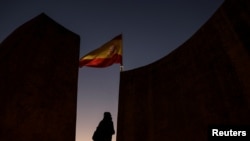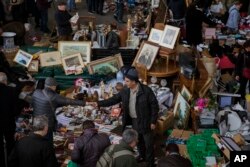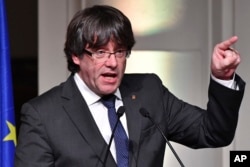Catalonia holds a regional election Thursday that the Spanish government hopes will strip pro-independence parties of their control of the Catalan parliament and end their campaign to force a split with Spain.
Voting began at 9 a.m. Thursday and the nearly 2,700 polling stations will remain open until 8 p.m. (1900 GMT).
But, though final polls showed separatist and unionist parties running neck-and-neck, an effective pro-independence majority remains a likely outcome that would jolt financial markets and cast a long shadow over national politics.
With a record turnout expected, the more than one-fifth who are undecided among the 5.5 million eligible voters could shift the election outcome.
Spanish Prime Minister Mariano Rajoy called the Dec. 21 vote in October in the hopes of returning Catalonia to “normality” under a unionist government. He sacked its previous government for holding a banned referendum and declaring independence.
Economy
A new separatist majority would further dampen investors’ confidence in Catalonia, which by itself has an economy larger than that of Portugal and is the main driver of Spain’s economic growth. However, pro-independence leaders recently have backed away from demands for unilateral secession.
The independence campaign pitched Spain into its worst political turmoil since the collapse of fascist rule and return of democracy in the 1970s. It has polarized public opinion, dented Spain’s economic rebound and prompted a business exodus from Catalonia to other parts of the country.
Thursday’s vote became a de facto referendum on how support for the independence movement has fared in recent months.
No clear majority
None of the six parties in the Catalan parliament — ranging across the ideological spectrum from separatist Marxists to the Catalan wing of Rajoy’s conservative People’s Party (PP) — are expected on their own to come close to the 68-seat majority.
So, analysts expect the next Catalan government to result from weeks of haggling between parties over viable coalitions.
An analysis of polling data by the Madrid daily El Pais published on Tuesday found that the most likely scenario is separatists securing a majority with the backing or abstention of the Catalan offshoot of anti-austerity party Podemos.
Podemos backs the unity of Spain but says Catalans should be able to have a referendum authorized by Madrid to decide their future. At the same time, Podemos favors a left-wing alliance of Catalan parties that both back and reject independence.
In this, analysts say, Podemos is caught between two options it does not particularly like, but would prefer to back the separatists rather than a coalition involving Rajoy’s PP.
Separatist parties campaigned against the backdrop of Spanish courts investigating their leaders on allegations of rebellion for their roles in the Oct. 1 referendum, which was ruled unconstitutional.
Deposed Catalan President Carles Puigdemont has campaigned from self-imposed exile in Brussels and his former deputy and now rival candidate, Oriol Junqueras, has done so from behind bars at a prison outside Madrid.
In a written interview with Reuters published on Monday, Junqueras struck a conciliatory tone and opened the door to building bridges with the Spanish state.


